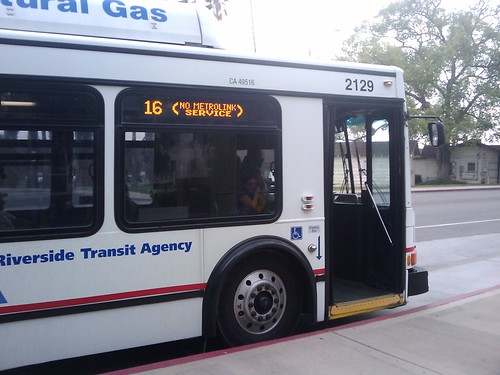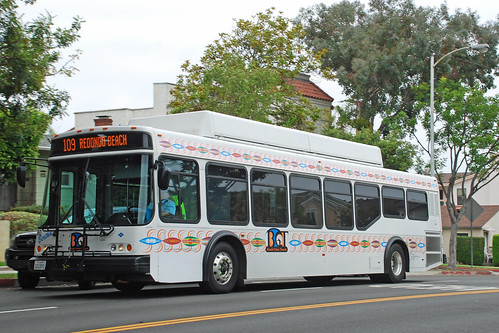This is a bus.
This is also a bus. They're both partial-low-floor 40-foot buses with front and rear doors and bicycle racks. For all I know, they are equipped with the same fareboxes. So what's the difference between them, besides the agencies and routes they serve?
The one on the bottom was built in Alabama, with parts largely made in Hungary. The one on the top was built in Rubidoux, just outside of Riverside, with mostly locally-produced parts.
Most federal grants have what are known as "Buy America" conditions, which require things purchased with the grant money to be made in America. The idea is to spend our money on creating jobs in our country, sensibly enough.
If the idea works on a national scale, why then shouldn't we implement it on a local scale as well? The LA Times today has an article on "local preference policies"- language in city and agency purchasing policies that give local businesses an edge in getting jobs and contracts- the proposed bonus to LA businesses in LA is 8%.
So, what's the difference between the two buses at the top of this post? One of them creates jobs and tax revenue in Riverside and Riverside County, allowing it to provide more service to more people in a more prosperous local economy. Isn't that something we should all hope for?
Tuesday, September 14, 2010
Local Preference Policies
Subscribe to:
Post Comments (Atom)




2 comments:
Came across this in your year end round up, but thought I would still comment. I don't know about the city, but the County has a 5% local preference. Interestingly, many federal funding sources prohibit local governments from using local preference, so even if you have it on the books, often you can't use it you are spending federal grant money. Title 49 of the U.S code appears to address buses particularly:
(h) Grant Prohibition.— A grant awarded under this chapter or the Federal Public Transportation Act of 2005 may not be used to support a procurement that uses an exclusionary or discriminatory specification.
(i) Bus Dealer Requirements.— No State law requiring buses to be purchased through in-State dealers shall apply to vehicles purchased with a grant under this chapter.
@Barry- Thanks for the comment. I enjoy doing this blog because I always end up learning something.
IANAL, but I still think it's a damn shame that Riversiders' tax dollars are buying buses from Alabama instead of Rubidoux.
Post a Comment